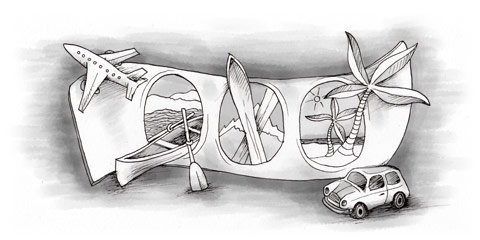Manchester is historically an industrial city in the north-west of England. Suffering economic decline after the Second World War Manchester has reinvented itself as a sporting, shopping and music mecca, with lots to offer its many visitors.
Manchester was at the heart of the Britpop movement in the 1990’s and indie bands such as Oasis and The Stone Roses are synonymous with the city. With all this musical heritage it’s not surprising that there are many great music venues. The Deaf Institute is a beautifully decorated setting right in the heart of the university district. Once an actual institute for the deaf, this venue serves food and drink in its cafe during the day and hosts a huge array of music events throughout the year. Another top music spot is Band on the Wall. Situated on the edge of the bohemian Northern Quarter, this is a legendary jazz and world music venue and has been a part of the music scene since the 1930s.
Manchester is home to a number of world-class art galleries and museums. The Whitworth Gallery is part of the University of Manchester and always has a fantastic range of temporary exhibitions as well as its permanent collection which features modern and historic art, textiles and a collection of rare wallpapers. The Lowry is a flagship museum set in the redeveloped Salford Quays within a modern glass and metallic structure. Visit this famous museum for a taste of performing and visual arts as well as the work of L.S Lowry a 20th Century artist who famously painted industrial scenes in Salford and the surrounding areas.
Heaton Park is Manchester’s largest green space and is situated just outside the city. Whether spending a full-day or a few hours there is plenty to see and do. Explore the tram museum, take a spin on the boating lake, or try your hand at golf or green bowling. There is also a packed events programme throughout the year including outdoor plays, concerts and dramas.
Manchester is home to some top class shopping areas that will satisfy even the most picky purchasers. The Arndale Centre is the UKs biggest city centre shopping mall, with over 240 retailers you will be hard-pressed not to spend some money. For a more unique shopping experience, check out Manchester’s vintage hot spots. The Manchester Vintage Fashion Market takes place every third Saturday of the month in Piccadilly. Search through what’s available to find rare, vintage pieces from the 1920s to the 1960s. The city is also home to some fashion heavy-weights, browse Vivianne Westwood, Calvin Klein, and many others in Selfridges.
For the foodies among you, the Manchester Food & Drink Festival is a must. Celebrating all that is great about food from the Greater Manchester region this festivals takes place in October in and around the city centre with a comprehensive programme of indoor and outdoor events.
For some historic and iconic architecture take a tour around the Town Hall, one of the best examples of ‘High Victorian’ style in England. Then wander down to Manchester Cathedral, what it lacks in size is made up for in superb features, medieval woodwork and stained glass abound. The John Rylands Library on Deansgate is the best Late Victorian Gothic building in the UK. Housing the oldest piece of the New Testament, first editions of Shakespeare’s sonnets and many more historic manuscripts. Exhibition rooms are found downstairs, but be sure to venture upstairs and marvel at the magnificent reading room.
No trip to Manchester would be complete without at least seeing Old Trafford or Etihad Stadium home to Manchester United and Manchester City respectively. Take a tour around Old Trafford, also known as the ‘Theatre of Dreams’. Experience the drama and excitement, explore behind the scenes and visit the museum, home to the trophy room, information and artefacts from the team’s great legends and interactive exhibits.
Getting to Manchester:
Plane - Manchester Airport offers direct connections with over 200 destinations worldwide.
Train - There are four main stations serving the city, of these Piccadilly is the busiest. Three trains leave every hour en route to London, a direct journey takes just over two hours. Services operate regularly to Liverpool, Birmingham and most other UK cities.
Coach - National Express and Megabus offer cheap coach services to many UK cities. Coaches depart daily for London and take around five and a half hours.
Car - Manchester’s ring road the M60 connects with motorways heading north, south, east and west.


